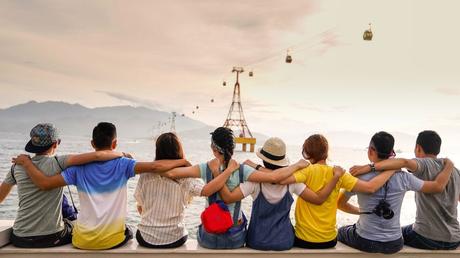
The urge to pair bond with another individual is deeply ingrained in our DNA. The biology, sociology, and psychology research backs it up. Most (but certainly not all) of us eventually tap into the urge to connect deeply with another human being. Much has been written and analyzed about love and relationships (heck, I teach an entire course on the history of love), but I'm more interested in a more basic need today. The need for connection.
Our need for belonging is central to our wellbeing. It is intimately linked to our identity, our motivations, and our happiness. Connection then plays a significant role in the development and maintenance of belonging. Think about the relationships that are most important to you. The more you feel connected to those loved ones, the more you feel as though you are a part of a community that cares for and supports you.
In recent decades, our need for connection has been focused more and more myopically on our significant others. We've come to rely on our partners to be everything to us- lover, caretaker, therapist, recreation partner, problem-solver, and support network. It was not always this way, though. Robert Putnam's Bowling Alone: The Collapse and Revival of American Community documented Americans' changing behavior over the decades, leading to increasingly isolated and disconnected lives in which we rely more on our partners and less on other social networks. This shift has had important ramifications for our mental and physical wellbeing.
This is where Eli Finkel's idea of the other significant other (OSO) becomes relevant. Finkel defines an OSO as a platonic family member or friend who plays a role in our life that our romantic partner simply can't. The reason is less an important than the meeting of that need for us as social creatures.
Ideas about romantic relationships, dating, and marriage have certainly changed in recent decades, or perhaps it is more accurate to say that they have always been changing. Americans are getting married later than they did a generation ago, although the average age of marriage did appear to dip slightly during the pandemic. More significantly, though, evolving gender roles have led to more egalitarian relationships and changes in employment patterns have shifted economic dependence.
These shifts don't tell the full story, however. Messages about the meaning of relationships have led to an increased dependence on a single person to meet all of our life needs. This simply isn't realistic or sustainable. Divorce rates may have dropped over the course of the last decade, but you don't need a divorce to recognize that depending on one person to meet all of your needs simply isn't sustainable.
Identifying OSOs in your life can help to more evenly distribute those needs, and in the process lead to increased connectedness and belonging. In order for this to be successful though, I would argue that both partners need to be invested in that quest. If one person is having their needs met by an OSO, but the other is not, the mismatch can become problematic. Likewise, we diminish our friendships if we keep them surface-focused, and don't open ourselves to the opportunity of a deeper connection.
Much has been written lately about the loneliness epidemic. Likewise, we continued to be concerned about physical and mental health and the toll the pandemic has had on each of them. Social connection is one means of addressing these concerns, and the more varied and diverse those social connections are, the more our needs are met and the more we are able to meet others' needs. We can't underestimate the importance of finding other significant others in our lives, and supporting that quest for those we care about as well. How are your social connections?
